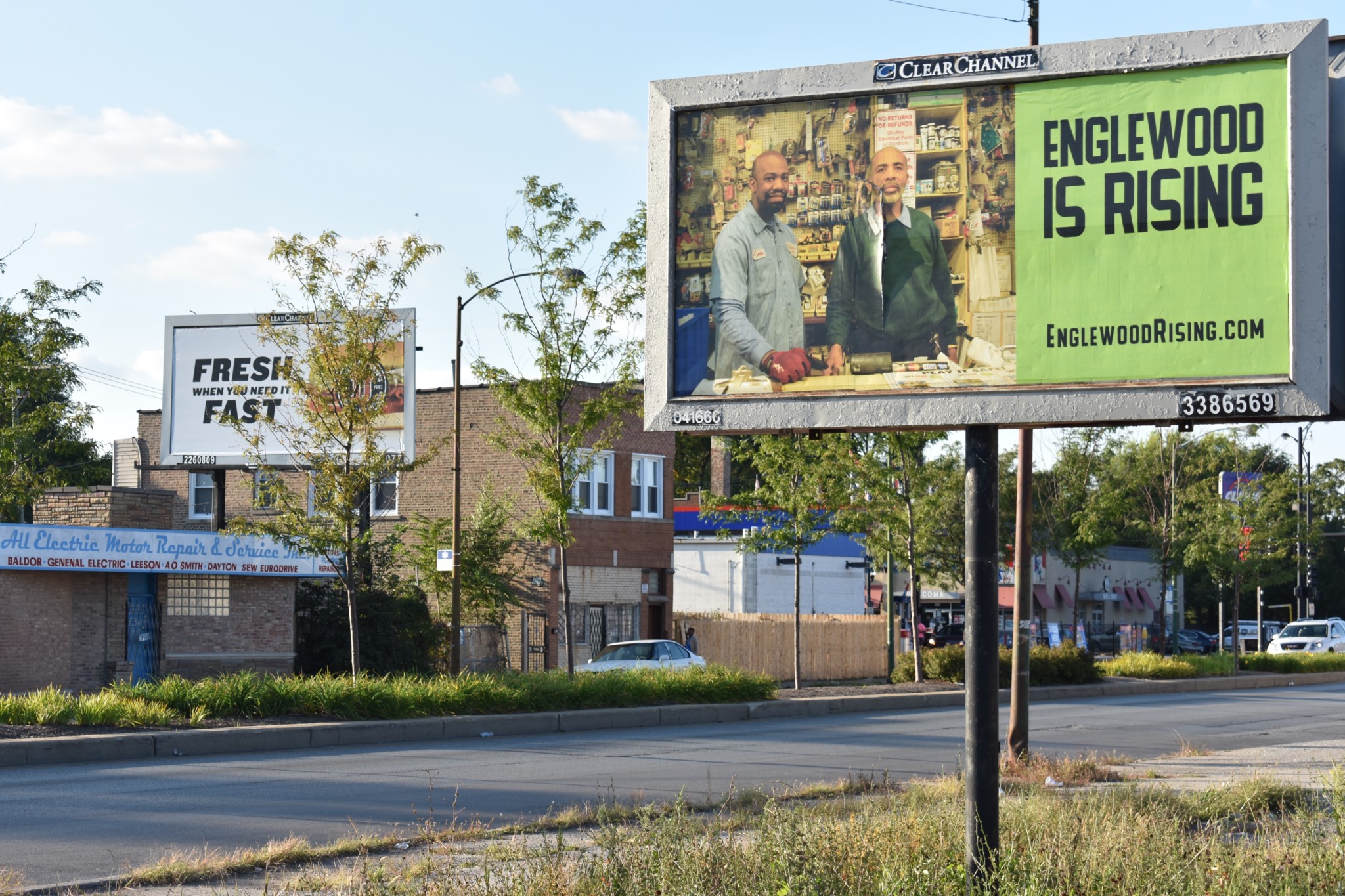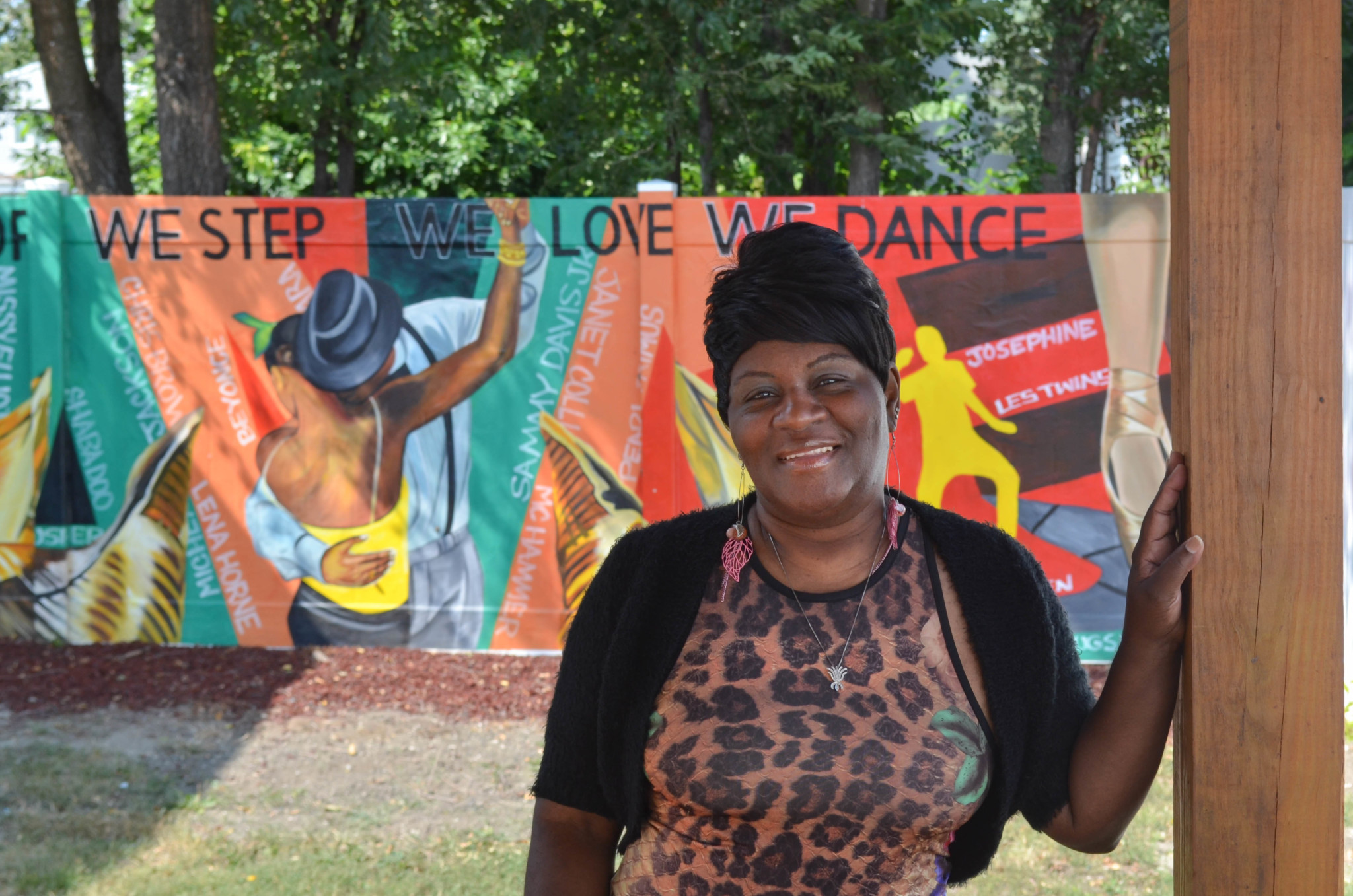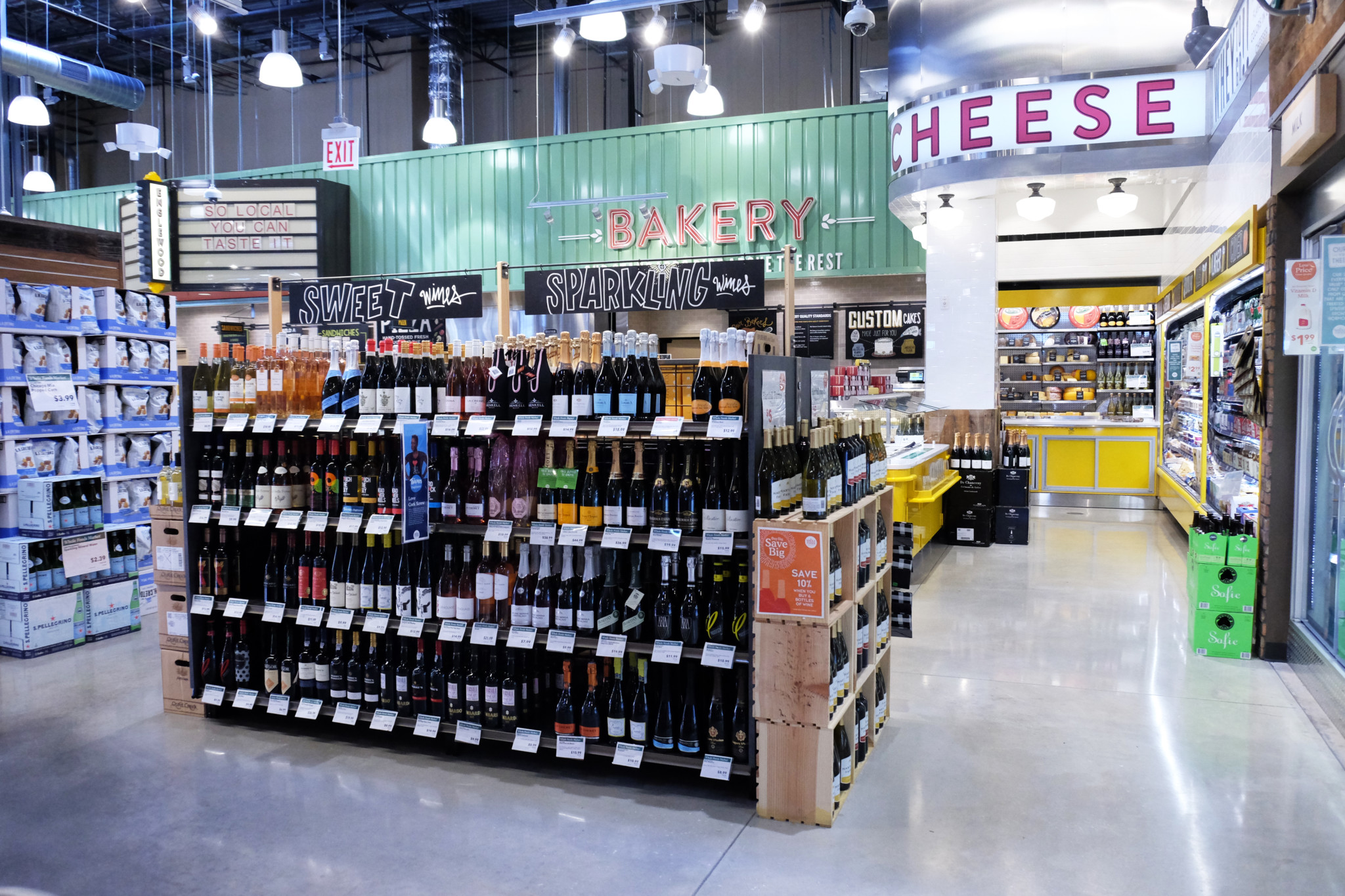- Best Community Hub
- Best T-Shirt Designer
- Best One-Dollar Lot
- Best Local Photographer
- Best Business Collective
- Best Wine Down
Asiaha Butler is the president of the Residents Association of Greater Englewood (R.A.G.E.), a former member of the Greater Englewood Community Development Corporation, and organizer of the Englewood Rising campaign, an initiative that brings together these and other community voices to promote positive narratives around the neighborhood.
The campaign launched billboards in April, featuring photos of Englewood residents in everyday life; its website also publishes profiles on local artists, business owners, and “change agents,” and there are more stories and a bigger social media push still to come.
Here, Butler talks about growing up and organizing in Englewood, and why the neighborhood needs a “rebrand.”
My mom and my dad met in Englewood, so I was pretty much born here. My mother grew up here her whole life; my grandfather was one of the first African Americans to purchase a home on his street.
Basically all my childhood was happening in Englewood. At seventeen, I moved in with my grandfather who lived [in Englewood], and then I met my husband when I was twenty, and then we purchased property together there [in 2002].
With R.A.G.E., the way it really came about, was, I literally was going to move away from my community. I have a daughter, she’s nineteen now, but at the time she was much younger. And the block where we purchased our house sort of ebbed and flowed, like it was really loud sometimes, a lot of violence—to the point that a bullet went through next to my door. So me and my husband just said, we’re just probably going to leave and not stay here in Englewood. And I don’t know what hit me, or what came over me, but I just thought, if we leave, we’re just like everyone else who leaves—middle class family, having a child, married, homeowners.
[People are] constantly inundated with negative images of the community. Outsiders are warned not to come near the area; every time on the news, every news media outlet has a negative connotation about the people here—no one cares, no work is being done.

I think when you are constantly overrun with negative images, when you have to constantly ride past vacant homes, vacant schools, vacant storefronts, it can really take a toll on your spirit, and it can take a toll on the way you feel about your community, until you don’t really value your community.
I [started] volunteering at some groups, and I started learning about some of the initiatives and plans that a lot of groups from outside the community were doing, and I just thought it was important that there be a resident voice there.
[At] the Greater Englewood Community Development Corporation, we had these pillars: rebrand, rebuild, revitalize. And the concept was, we need to rebrand the negative image [that] is talked about with Englewood here. If we want people to stay, they have to look at the community in a different way. If we want people to come into the community, they also have to look at the community in a different way. And that’s before you rebuild and revitalize, before you do anything concrete. It doesn’t matter if you get a Whole Foods, if people still have the perception that they’re going to get shot if they shop there.
[It’s about] showing that it’s love here, that it’s resilience here, it’s beauty here—and that we’re not what the media portrays us to be sometimes. It’s just people who want to live, be free, and be here.
[For] Englewood Rising, the community voted on that theme and thought about all the things that we could do to rebrand the community.
I really am excited about it. I think it hasn’t even went as far as we want to go and it already has a lot of traction, and it’s becoming this phenomenon. Because Englewood has suffered for years, so to even talk to people that Englewood is rising, it gives that affirmation, that we’ve already risen, [and] we’re continuing to rise.
I think like, for us, there’s a lot of beauty within the community that is often just missed. A lot of people are working really hard, there’s a lot of organized groups here, there’s a lot of great energy and synergy in the area. It’s just something that no one talks about. If you Google Englewood right now, you’re going to hear about the crime that happened here today, you’re going to hear about the negativity. But nobody highlights our housing stock, that we’re close to transportation, the fact that we’re geographically centered in middle of the city; nobody talks about the beautiful parks in the community.
So we want to help people value their community—we hope that resonates with people who live here. And then to see themselves on the billboards and feel proud, that I’m from Englewood. (As told to Hafsa Razi)
Hamilton Park Cultural Center
Nestled between railroad lines and residential lots, Hamilton Park, and its cultural center, is a nearly thirty-acre park offering space and activities for youth, adults, and families on 72nd Street. In the summer, residents enjoy the outdoor fifteen-yard pool, baseball diamond, and basketball courts. But despite the changing season, activities at Hamilton Park show no signs of slowing down. From October 5 to 7, PEACEBOOK, an annual arts festival of spoken word poetry, dance, and theater will be in Hamilton Park. Inside the cultural center, you can also find educational programs like TRACE (Teens Reimagining Art, Community, and Environment), which is headquartered in the center. This fall, programming from the Park District for youth and adults includes archery, dance, flag football, and basketball. For teens, there’s a leadership club that combines service in the park with fun and games. There’s also programming for seniors, including dance classes and Senior Citizens Club. Hamilton Park was created in 1904, envisioned as a “breathing space” where individuals could enjoy the outdoors and take part in various services and educational opportunities. Over a century later, that multifaceted intention remains. (Erisa Apantaku)
Hamilton Park and Cultural Center, 512 W. 72nd St. Fieldhouse hours: Monday–Friday, 8am–8pm; Saturday, 9am–5:30pm. Park hours: 6am–11pm. (312) 747-6174. chicagoparkdistrict.com/parks/hamilton-park
Corie Luckett of Englewood Branded

Fifteen years ago, Englewood resident Corie Luckett decided he didn’t like the way T-shirts looked. They didn’t speak to him or his community, and he wanted to change that. So Luckett dug up an old photo of his siblings, taught himself to screenprint, and placed the image on a plain tee—his very first shirt. Since then, Luckett has designed custom work for charter schools, musicians, and, above all, the people of Englewood. In three weeks, he’s even opening his own storefront.
Luckett, who has lived in Englewood for more than thirty-five years, is the founder of Englewood Branded, a clothesline and soon-to-be-open store that seeks to reflect the experiences of locals and provide hope through fashion.
“The brand is for Englewood, for people to be able to have a sense of pride in where they come from,” Luckett said.
T-shirts, sweatshirts, hoodies, and thermals of all colors and sizes proudly don the block-letter “Englewood Branded” insignia, while others feature phrases like “Love, Respect, Honor, Dedication” and “Replace Gunz w/ Hammers.” Luckett plans to add baseball caps, coffee mugs, and key chains to his inventory before opening the storefront, fleshing out his “souvenir shop for Englewood.”
But that’s not all Luckett hopes to offer. Englewood Branded will also be a classroom. Luckett is launching a Printing with Youth initiative—an after-school program and Saturday morning mentoring workshop to teach young Englewooders how to screenprint. More than twenty kids have already approached Luckett about employment.
“People are coming in to help, to work, to ask for jobs. When you have a community that is mostly looked at as a community that doesn’t want those things, it’s encouraging,” Luckett said.
In addition to his Englewood Branded line, Luckett has helped other local groups develop their own personas. Luckett has designed for the Chicago clothing line Fly Authentic Fashion, as well as the organizations Teamwork Englewood and After School Matters.
“At the point where I am, there’s a beauty in helping someone bring an idea to life and make it a reality,” Luckett said. “So many times I see people in clothes I printed, and they don’t know I made it, but I just smile.” (Grace Hauck)
Englewood Branded, 1546 W. 63rd St. Opening soon.
The Hammonds’ Community Lot

“It’s a space that’s built out of love and caring and concern for our neighborhood,” Tina Hammond explains on the wooden deck of her lot at 68th and Paulina. A stone walkway leads guests from the sidewalk to the deck, passing a small garden and several benches on the way. “I just want people to know the possibilities, the talents, and the gifts that we have in the Englewood community.”
The Hammonds purchased the one-dollar lot from the city through its Large Lots program and refurbished it with the help of community organizations Resident Association of Greater Englewood, Local Initiatives Support Corporation Chicago, and Teamwork Englewood. Thirteen years ago, when the fence around the empty lot was taken down, the Hammonds began cleaning the land despite not owning it, in order to keep the block well-maintained. They decided to purchase the lot so they could do more than just keep it clean.
And do more they have. Tina had the vision, and her husband Alvin Hammond Sr. implemented the design. “Little boys would come by and watch my husband and say, ‘[That’s] a lot of work, huh?…What is it for? What is it gonna be for? Can anybody come over there? Can anybody come over there?’ So they’re excited, but I feel that we need so [many] more spaces like this.” Alvin finished renovating the lot on August 1. Since then, the lot has been used for yoga, dancing, and the Hammonds’ twenty-seventh wedding anniversary celebration. Tina plans to continue using the lot as a space for community members to play cards, dance, and play music. “It does my heart good to wake up every morning, look out my door and see the beauty that’s over here. And that we deserve. We deserve beauty in our community just like any other community.”
Tina hopes more people will be motivated by what her and her husband have done. Even if the lots are privately owned and thus can’t be bought through the city, Tina encourages others to clean the lots and sidewalks in their neighborhoods. “If you clean up, we can change this community one business, one house, one block at a time.” (Erisa Apantaku)
6832 S. Paulina St. Open by appointment. Email t-dickey@sbcglobal.net
Tonika Johnson
Tonika Johnson is making heads turn lately. The Englewood native has been documenting the mundane, the beautiful, and the overlooked in her neighborhood, showing a life rarely noticed by the usual slew of photojournalists reporting on the latest shooting. She likes to document life’s everyday moments—teenagers hanging out with their bikes, a mother and daughter sharing a sweet embrace, a boy getting a cut in a barbershop. Her work can be seen on billboards across Englewood, as part of the neighborhood’s “Englewood Rising” quality of life rebranding campaign. The Weekly also featured her photos in January, and this summer she was also City Bureau’s first photography fellow. She is involved in other projects aimed at building and strengthening her community, like the Englewood Arts Collective (featured in the Weekly’s 2017 Interview Issue) and Growing Home, an urban farm and job-training program centered in Englewood. For now, Johnson is busy working on a project that aims to visually represent segregation in Chicago. Look out for that in the coming weeks. (Adam Przybyl)
With the Englewood Arts Collective, Johnson’s work will be featured in an upcoming exhibition at Kusanya Cafe, 825 W. 69th St. Saturday, November 4. tonijphotography.com
E.G. Woode
Five new businesses are coming to two locations along the 63rd Street corridor: a design firm, commercial kitchen, urban grill, consignment store, and barbershop and college. The low-profit businesses are held collectively under the new real estate developer E.G. Woode (an ode to En-gle-wood), which strives to promote local and minority entrepreneurship.
The collective formed in response to a request for applications from the City of Chicago’s Retail Thrive Zone initiative, a three-year pilot program that seeks to combat the economic conditions that lead to crime by investing in small businesses. Five Englewood entrepreneurs collaborated to draft and submit applications, and each won the promise of a $100,000 reimbursable grant.
“There are thousands of people in this neighborhood that know how to do their job,” said E.G. Woode cofounder Deon Lucas. “They just do not have the capital or social systems to execute effectively as an entrepreneur.”
Now, they’ll have that chance. Lucas will captain Beehyyve, an architecture firm operating in Englewood and its surrounding neighborhoods. The group will use fifty percent of its profits to assist those at risk of losing their homes due to property violations; the other fifty percent will fund scholarships for residents interested in STEAM careers.
Sunni A. Powell will run one of the country’s only cooperative barbershop-colleges, which will train four to five local student-barbers at a time. The business will also give back to the city by putting twenty percent of its profits toward establishing new cooperatives, as well as donating one hundred percent of its profits from its auxiliary coffee and tea services to Englewood-based nonprofits.
Just above Powell’s, Marie | Wesley (MW), a consignment shop run by Nanette Tucker, will be dedicated to employing people that have difficulty finding work, such as those with disabilities or criminal records. Like the barber college, MW will also offer a teaching component: Tucker, which will recruit fashion designers from local schools to design under her brand.
About two blocks west, in the second building, Jordan Buckner will run Englewood Kitchen, an incubator for fifteen aspiring culinary artists. Forty percent of the kitchen’s profits will be reinvested in other Chicago food ventures, and sixty percent will be invested in the ventures of incubator members.
“In 2016, I launched a food business, TeaSquares, which are tea-infused snacks now sold in Chicagoland Whole Food Markets. Throughout that process, I learned firsthand the difficulties of starting a new company, and the resources required,” Buckner said. “Having a commercial kitchen available to test and manufacture product is one of the key resources needed to be successful.”
Just below Buckner’s kitchen, Antoine Butler will be running Ellie’s Urban Grill, a casual dining experience and sports-watching hub. Butler hopes to sponsor equipment for youth sports and provide scholarships to employees interested in sports or management.
To accomplish these goals, the collective is also soliciting independent investors to help fund the $500,000 cost of the two building locations—each of which will incorporate sustainable Leadership in Energy and Environmental Design (LEED) strategies—as well as the estimated $750,000 in construction, scheduled to begin this February. So far, the collective has already raised $115,000.
“Englewood seemed very promising from a development standpoint,” Lucas said. “If we can make this project happen here, we can assist other entrepreneurs in other neighborhoods too.” (Grace Hauck)
1009 W. 63rd St. and 1122 W. 63rd St. Coming next year. egwoode.com
5 After 5 at Whole Foods Market

One year old next week, Whole Foods Englewood hasn’t just transformed neighborhood grocery shopping—it has revolutionized happy hour. From 5pm to 7pm every Friday night, this food-market-by-day morphs into a chic live music lounge. Invest five dollars in an Englewood-branded wine glass, and you’ll get to sample five different wines, each paired with a small appetizer. (If you bring your glass back the next time, you can steal the same deal for four dollars.)
Last week’s 5 After 5 featured such pairings as Charles Smith Wines’ Kung Fu Girl Riesling with apple cranberry walnut salad and Henkell rosé with smoked salmon. For dessert: a fudge brownie and vintage port.
“It definitely doesn’t look like a grocery store on Friday nights. I can tell you that,” said Whole Foods employee Cecile De Mello.
That’s because the store literally changes. Employees clear out the tables and chairs from the store’s café section to create a dance floor with speakers and room for more than a hundred grooving patrons. Musicians hail from across the South Side and play a range of genres from Brazilian to R&B.
Not yet twenty-one? Whole Foods also offers in-store yoga and cooking classes throughout the week. (Grace Hauck)
Whole Foods Market Englewood, 832 W. 63rd St. Monday–Sunday, 8am–8pm; 5 after 5: Friday, 5pm–7pm (773) 896-9800. wholefoodsmarket.com/stores/englewood
Correction: 9/23/2017
A previous version of the interview with Asiaha Butler misstated details of her personal life. It has been updated to reflect that Butler moved in with her grandfather at age seventeen, and that she purchased a home in 2002.
Support community journalism by donating to South Side Weekly


I love this article, don’t count us out EngleWood had great Stock.Thank you for the opportunity to showcase my Lot????
Great article! I’m not from Englewood but I work here, and I am from a very similar neighborhood. I admire the positivity that RAGE represents for the Englewood community. Keep up the great work!
I live in Englewood, don’t really want to leave but to see the neighborhood rise up out of the ashes and become a productive environment for all to see, by the people for the people. I know we can do it if we try. Anything positive I’m with it. Sign me up.